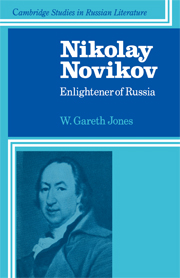Book contents
- Frontmatter
- Contents
- Acknowledgements
- Foreword
- 1 Noble beginnings (1744–69)
- 2 A family of satirical weeklies (1769–73)
- 3 The Drone (1769–70)
- 4 Imperial patronage (1770–3)
- 5 In search of the Russian reader (1773–5)
- 6 Disillusions and doubts (1774)
- 7 The historian (1773–91)
- 8 The freemason (1775–80)
- 9 A move to Moscow (1779–83)
- 10 The Russian reader discovered (1779–82)
- 11 The Typographical Company (1784–91)
- 12 Martyrdom and meditation (1791–1818)
- Afterword
- Notes
- Bibliography
- Index
8 - The freemason (1775–80)
Published online by Cambridge University Press: 05 November 2011
- Frontmatter
- Contents
- Acknowledgements
- Foreword
- 1 Noble beginnings (1744–69)
- 2 A family of satirical weeklies (1769–73)
- 3 The Drone (1769–70)
- 4 Imperial patronage (1770–3)
- 5 In search of the Russian reader (1773–5)
- 6 Disillusions and doubts (1774)
- 7 The historian (1773–91)
- 8 The freemason (1775–80)
- 9 A move to Moscow (1779–83)
- 10 The Russian reader discovered (1779–82)
- 11 The Typographical Company (1784–91)
- 12 Martyrdom and meditation (1791–1818)
- Afterword
- Notes
- Bibliography
- Index
Summary
And Pierre began to expound Freemasonry to Prince Andrey as he understood it. He declared that Freemasonry was the doctrine of Christianity freed from political and religious dogmatic bonds: the doctrine of equality, fraternity and charity.
War and PeaceRussian freemasonry
In all his activities, as journalist, publisher and historian, Novikov's desire had been not to act in isolation. Preface after preface had called on Russian writers and patriots to help him in his ventures, and that help had been forthcoming. The journals had drawn the young literary men, many of them graduates of Moscow University, into an embryonic literary society, and the Ancient Russian Library had obliged Novikov to form strong bonds of interest with men like Gerhard Muller and P. K. Khlebnikov. This urge for collectivism had been fostered by Catherine, as was evident in the organisation of the combined literary endeavours of the minute-writers of the Legislative Commission, and of her ‘family’ of satirical periodicals. By acknowledging at every turn the lead given to him by his sovereign, Novikov was showing how abiding an influence were the ancient presumptions of Muscovite centralisation. In Catherine's age the old system of tutelage (opeka) was still alive: indeed it had not really passed from the Russian scene for, as Pypin argued, even the enforced character of the Petrine reforms, although condemned by the Slavophiles for being enforced, was itself the heritage of ancient state practice.
- Type
- Chapter
- Information
- Nikolay NovikovEnlightener of Russia, pp. 127 - 148Publisher: Cambridge University PressPrint publication year: 1984



